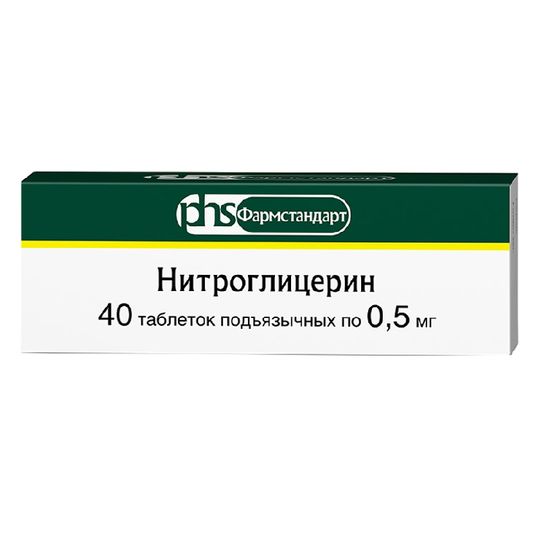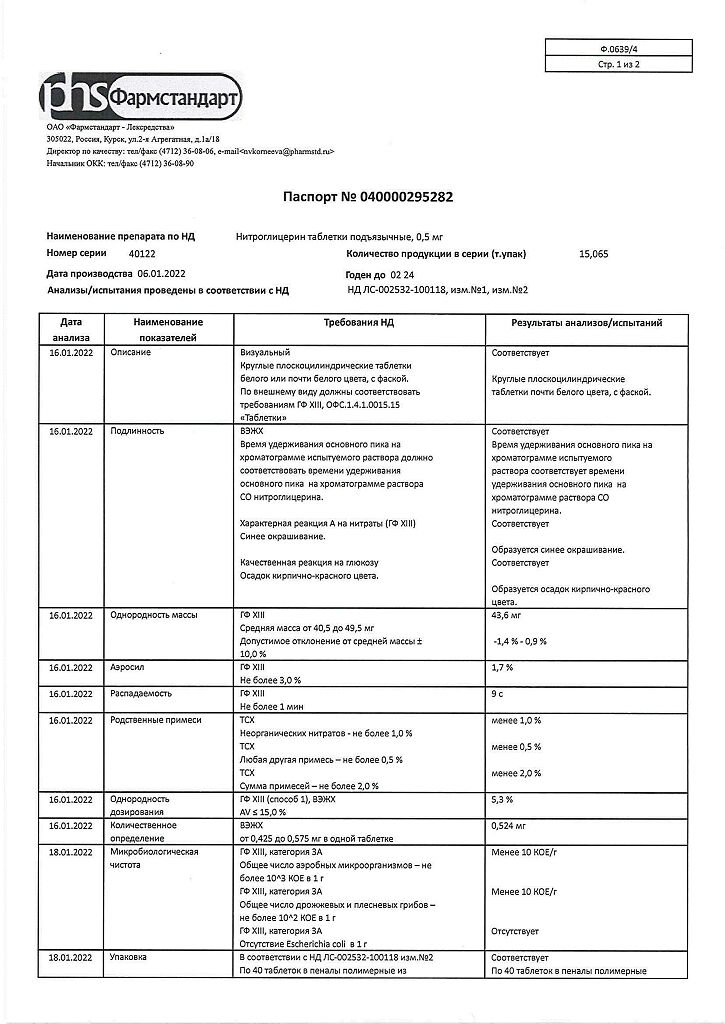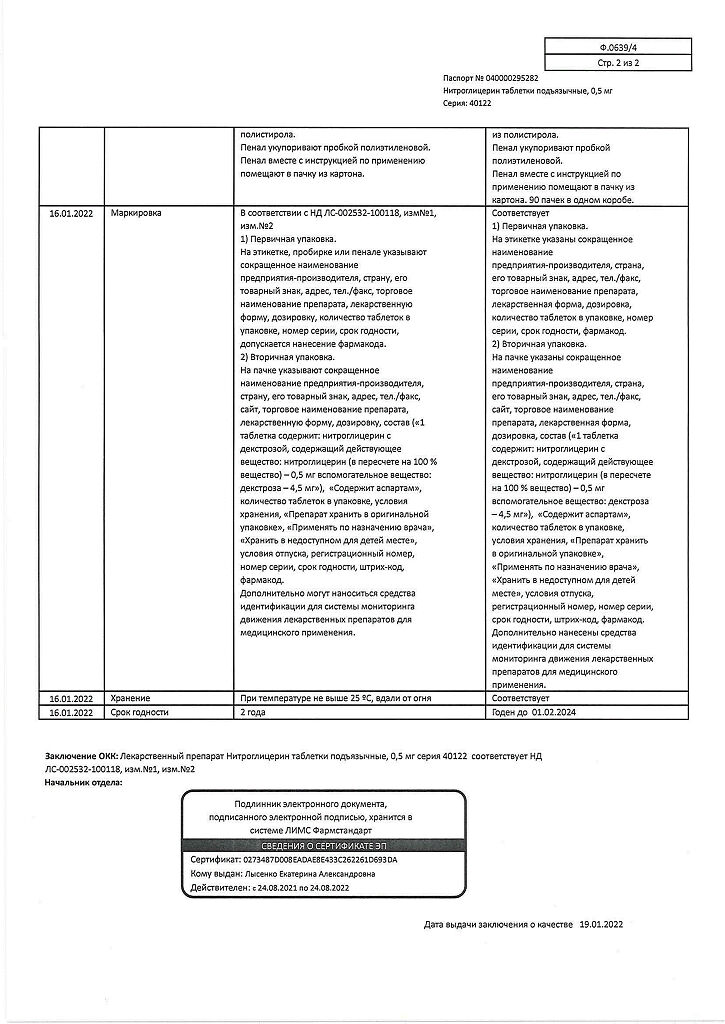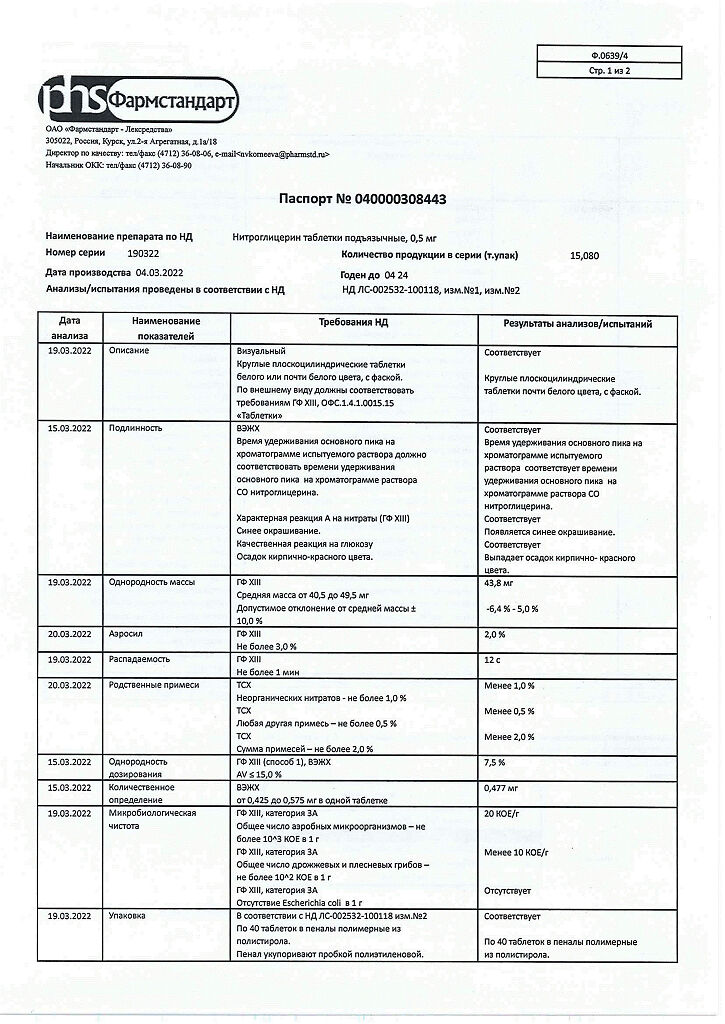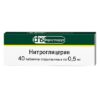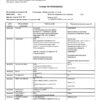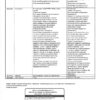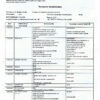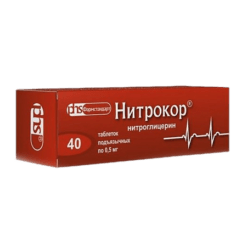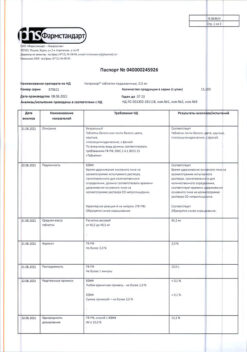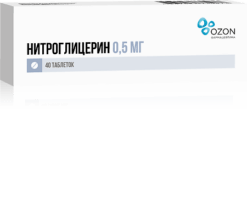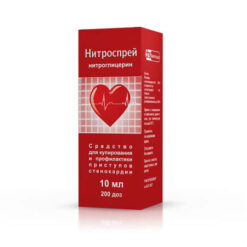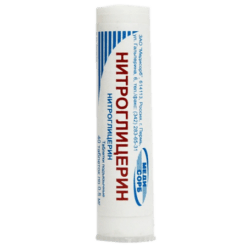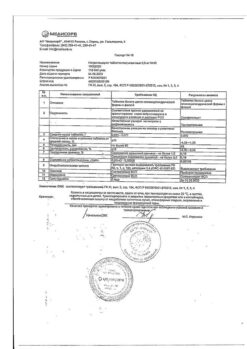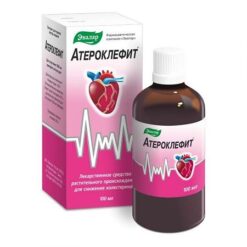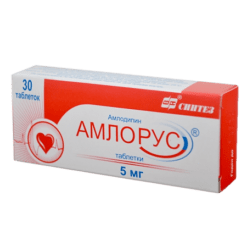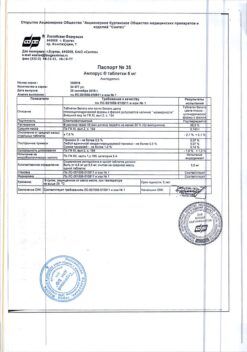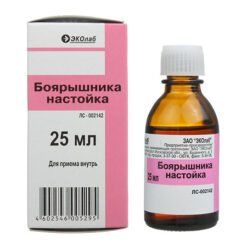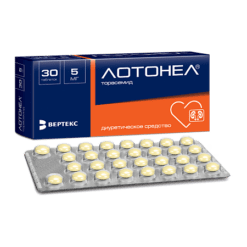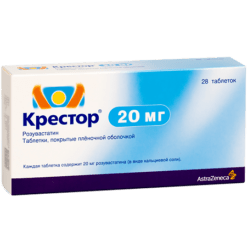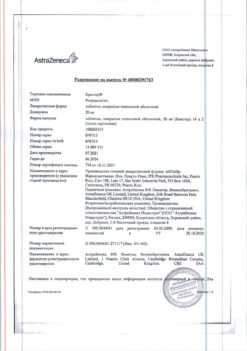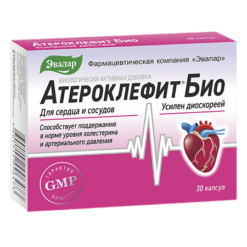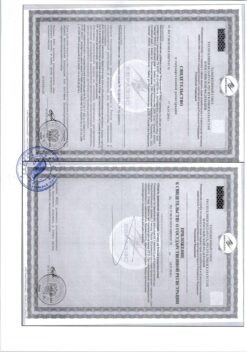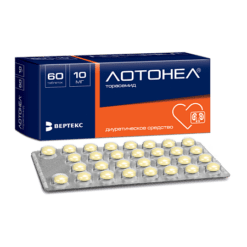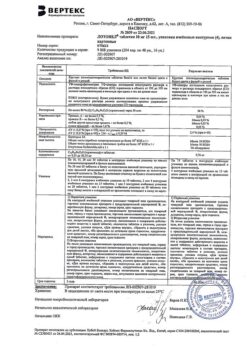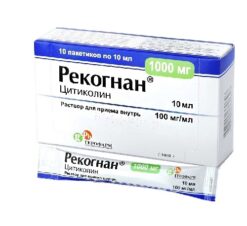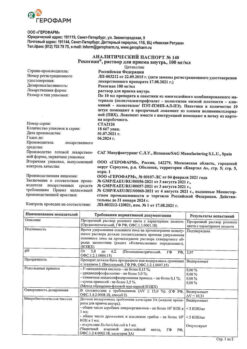No products in the cart.
Nitroglycerin, 0.5 mg 40 pcs
€2.28 €2.07
Description
Dilates blood vessels (mainly coronary/cardiac arteries and brain vessels), relaxes smooth muscles of the gastrointestinal tract, biliary tract and other organs.
Along with decreasing resistance of coronary and peripheral vessels, nitroglycerin decreases venous return of blood to the heart, contributes to redistribution of blood flow in the myocardium (heart muscle) in favor of the focus of ischemia and reduction of ischemic lesions in myocardial infarction, increases inotropic (contractile) myocardial function.
Like other organic nitrates, nitroglycerin improves metabolic processes (metabolism) in the myocardium and reduces myocardial oxygen demand.
Indications
Indications
For sublingual and buccal use: relief and prevention of angina attacks; as an emergency medicine for acute myocardial infarction and acute left ventricular failure at the prehospital stage.
For oral administration: relief and prevention of angina attacks, rehabilitation treatment after myocardial infarction.
For intravenous administration: acute myocardial infarction, incl. complicated by acute left ventricular failure; unstable angina; pulmonary edema.
For cutaneous use: prevention of angina attacks.
Pharmacological effect
Pharmacological effect
Dilates blood vessels (mainly coronary / cardiac / arteries and brain vessels), relaxes the smooth muscles of the gastrointestinal tract, biliary tract and other organs.
Along with reducing the resistance of coronary and peripheral vessels, nitroglycerin reduces the venous return of blood to the heart, promotes the redistribution of blood flow in the myocardium (heart muscle) in favor of the ischemic focus and the reduction of ischemic lesions during myocardial infarction, and enhances the inotropic (contractile) function of the myocardium.
Like other organic nitrates, nitroglycerin improves metabolic processes (metabolism) in the myocardium and reduces the myocardium’s need for oxygen.
Special instructions
Special instructions
Use with caution in patients with severe cerebral atherosclerosis, cerebrovascular accidents, with a tendency to orthostatic hypotension, with severe anemia, in elderly patients, as well as with hypovolemia and severe impairment of liver and kidney function (parenterally).
With prolonged use, tolerance to the effects of nitrates may develop. To prevent the occurrence of tolerance, it is recommended to observe a 10-12 hour break in their use during each 24-hour cycle.
If an attack of angina occurs during cutaneous use of nitroglycerin (glyceryl trinitrate), it should be stopped by taking glyceryl trinitrate under the tongue.
During the treatment period, avoid drinking alcohol.
Impact on the ability to drive vehicles and operate machinery
Glyceryl trinitrate may reduce the speed of psychomotor reactions, which should be taken into account when driving vehicles or engaging in other potentially hazardous activities.
Active ingredient
Active ingredient
Nitroglycerine
Composition
Composition
For one tablet:
active substance:
nitroglycerin with dextrose (nitroglycerin with glucose) – 0.5 mg (based on 100% substance);
excipients:
aspartame – 0.3 mg,
colloidal silicon dioxide (Aerosil) – 0.9 mg,
stearic acid – 0.4 mg,
croscarmellose sodium – 1.0 mg,
potato starch – 2.6 mg,
microcrystalline cellulose – 34.8 mg.
Contraindications
Contraindications
Hypersensitivity to nitrates, shock, collapse, simultaneous use of PDE 5 inhibitors (sildenafil, tadalafil, vardenafil, etc.), age under 18 years (efficacy and safety have not been established for ages under 18 years).
Side Effects
Side Effects
From the cardiovascular system: dizziness, headache, tachycardia, skin hyperemia, feeling of heat, arterial hypotension; rarely (especially with overdose) – collapse, cyanosis.
From the digestive system: nausea, vomiting.
From the side of the central nervous system: rarely (especially in case of overdose) – anxiety, psychotic reactions.
Allergic reactions: rarely – skin rash, itching.
Local reactions: mild itching, burning, redness of the skin.
Other: methemoglobinemia.
Interaction
Interaction
When used simultaneously with vasodilators, ACE inhibitors, calcium channel blockers, beta-blockers, diuretics, tricyclic antidepressants, MAO inhibitors, ethanol, ethanol-containing drugs, the hypotensive effect of glyceryl trinitrate may be enhanced.
When used simultaneously with beta-blockers and calcium channel blockers, the antianginal effect is enhanced.
When used simultaneously with sympathomimetics, it is possible to reduce the antianginal effect of glyceryl trinitrate, which, in turn, can reduce the pressor effect of sympathomimetics (as a result, arterial hypotension is possible).
With the simultaneous use of drugs with anticholinergic activity (including tricyclic antidepressants, disopyramide), hyposalivation and dry mouth develop.
There is limited evidence that acetylsalicylic acid, used as an analgesic, increases the concentration of nitroglycerin (glyceryl trinitrate) in the blood plasma. This may be accompanied by increased hypotensive effect and headaches.
A number of studies have observed a decrease in the vasodilating effect of nitroglycerin (glyceryl trinitrate) during long-term therapy with acetylsalicylic acid.
It is believed that it is possible to enhance the antiplatelet effect of acetylsalicylic acid with the use of nitroglycerin (glyceryl trinitrate).
When used simultaneously with nitroglycerin, the effect of acetylcholine, histamine, and norepinephrine decreases.
Against the background of intravenous administration of nitroglycerin, the anticoagulant effect of heparin may be reduced.
With simultaneous use, it is possible to increase the bioavailability of dihydroergotamine and reduce the antianginal effect of nitroglycerin (glyceryl trinitrate).
When used simultaneously with novocainamide, the hypotensive effect and the development of collapse may be enhanced.
When used simultaneously with rizatriptan, sumatriptan, the risk of developing coronary artery spasm increases; with sildenafil – the risk of developing severe arterial hypotension and myocardial infarction; with quinidine – orthostatic collapse is possible; with ethanol – severe weakness and dizziness.
Overdose
Overdose
Symptoms: decreased blood pressure (below 90 mm Hg) with orthostatic dysregulation, severe dizziness, headache, fainting, shortness of breath, severe weakness, rapid heartbeat, increased body temperature, convulsions, asthenia, drowsiness. When using high doses – collapse, cyanosis, methemoglobinemia, dyspnea and tachypnea.
Treatment: if symptoms of overdose appear, immediately lay the patient down, elevate his legs and urgently call a doctor.
Storage conditions
Storage conditions
Store at a temperature not exceeding 25 o C, away from fire.
Keep out of the reach of children.
Shelf life
Shelf life
2 years.
The drug should not be used after the expiration date.
Manufacturer
Manufacturer
Pharmstandard-Leksredstva, Russia
Additional information
| Shelf life | 2 years. The drug should not be used after the expiration date. |
|---|---|
| Conditions of storage | Store at a temperature not exceeding 25 o C, away from fire. Keep out of reach of children. |
| Manufacturer | Pharmstandard-Leksredstva, Russia |
| Medication form | sublingual tablets |
| Brand | Pharmstandard-Leksredstva |
Other forms…
Related products
Buy Nitroglycerin, 0.5 mg 40 pcs with delivery to USA, UK, Europe and over 120 other countries.

